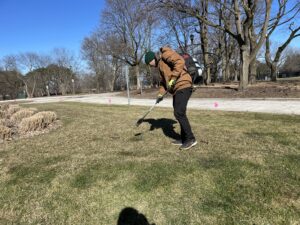The uphill battle against invasive weeds in our parks.

Good Nature Organic Lawn Care applies flame treatment to manage lesser celandine.
Wilmette, Illinois, March 7, 2024 — Wilmette Park District’s 60-acre Gillson Park resides just north of the Baha’I House of Worship. This coastal park includes beaches, an outdoor Ampitheater, youth soccer fields, tennis courts and a wildflower garden.
Wilmette Park District and uplandDesign ltd completed a Master Landscape Plan for Gillson Park this January. The plan enhances the park’s natural areas by planting 358 trees, 540 shrubs and 8,824 perennials, ornamental grasses and groundcovers. Unfortunately, the invasive weed of lesser celandine threw a wrench into the master plan’s vision.
“The lesser celandine formed a mat on the ground that prevents growth from other plants and limits our ability to foster healthy biodiversity at Gillson Park,” said Kristi Solberg, the superintendent of parks and planning for Wilmette Park District.
The war against weeds in parks
Park managers such as Solberg have fought invasive weeds for many years. The weeds, however, have the upper hand in this battle. Lesser celandine’s rapid spread at Gillson Park since 2020 best symbolizes this advantage.
“The Wilmette Park District has performed most of the control practices that invasive weed experts and practitioners have identified for this weed,” said Ryan Anderson, leader of the non-profit sustainable landscaping initiative Midwest Grows Green. “Despite these efforts, the lesser celandine pressure at Gillson Park reached its highest levels this spring.”
Literature proposing control strategies for lesser celandine is sparse. Most articles recommend glyphosate-based herbicide applications, because these products kill the entire targeted plant from stem to root. Glyphosate is the active ingredient for many herbicides under the popular brand name of Roundup. The US applies more glyphosate-based herbicides to manage invasive weeds than any other herbicide product.
“The science tells us that herbicides are the most cost-effective way to control weeds. But, what should we do if the weeds survive routine herbicide applications?” Anderson asked.
Alternative invasive weed management approaches to pesticides
Wilmette Park District consulted with Midwest Grows Green after multiple applications of Roundup and other herbicide products between 2021 and 2023 failed to control the lesser celandine invasion. Midwest Grows Green’s Technical Assistance Program created a plan for Wilmette Park District that should both limit herbicide applications and suppress the spread of lesser celandine. The plan best responds to the community’s interests in avoiding the environmental and human health risks of pesticides.
“The Wilmette community values our natural areas and they want to leave these areas as natural and untouched as possible,” explained Solberg. “Resorting to only synthetic herbicide applications for management of invasive weeds could trigger a loss of biodiversity and other negative outcomes for the Gillson Park ecosystem.”
Many communities share similar values to the Wilmette community and want greenspace managers to avoid synthetic pesticides. More than 150 US cities have restricted or banned glyphosate-based herbicides after the International Association for the Research on Cancer classified glyphosate as a probable carcinogen due to the chemical’s link to Non-Hodgkin’s lymphoma.
“I believe the Green sector will need to avoid toxic pesticides to meet public needs and interests and eventually the law,” said Alec McClennan, the Founder and CEO of Good Nature Organic Lawn Care. “Midwest Grows Green understands the need to reduce pesticide applications and they are building the infrastructure to grow healthier and safer greenspaces in the future.”
In February, Good Nature began a flaming treatment program at Gillson Park that employs heat to denature the lesser celandine plant cells. This treatment should bolster the effectiveness of future organic and synthetic herbicide applications by preventing lesser celandine reproduction and spread in the park. Stopping the spread of invasive weeds in the Greater Chicago region requires the implementation of comprehensive and targeted management plans similar to the Gillson Park program.
“Will lesser celandine be gone next year at Gillson? No. But, we expect to see annual reduction in invasive weed pressure that will enable Wilmette Park District to realize the Gillson Park Master Landscape Plan’s vision,” Anderson explained.
Many greenspace managers would consider suppression of lesser celandine at Gillson Park a major win in this strenuous war against invasive weeds.
About Midwest Grows Green and the IPM Institute of North America
Midwest Grows Green is an initiative of the 501(c)3 non-profit IPM Institute of North America, Inc. that educates and empowers citizens to take sustainable landscaping action that reduces harmful runoff into our waterways, protects the health of our most vulnerable citizens and reduces negative impacts of pesticides on non-target species such as pollinators.
For more information about the IPM Institute and Midwest Grows Green please visit www.MidwestGrowsGreen.org.
Is your local park district or municipality prepared to manage invasive weeds? Encourage them to attend Midwest Grows Green’s Natural Lawn Care Workshop on March 19th at the Experimental Station or Viable and Safe Alternatives to Glyphosate workshop on March 20th at Gillson Park’s Lakeview Center. To learn more about sustainable landscaping and apply these practices into your own yard, please visit and take the MGG pledge at bit.ly/MGGpldg.
